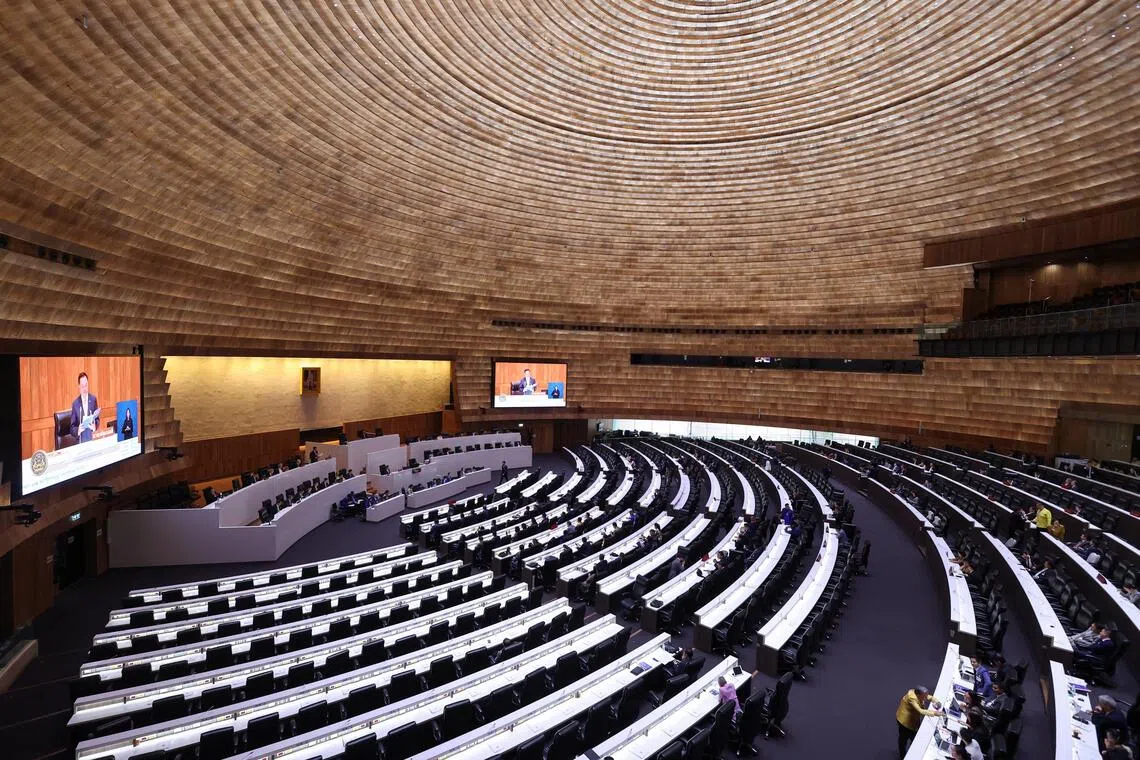Thailand’s new PM outlines policies to parliament amid economic challenges
On the agenda are measures to reduce living costs, tackle household debt and stimulate domestic tourism
[BANGKOK] Thai Prime Minister Anutin Charnvirakul on Monday (Sep 29) outlined his government’s policy agenda to parliament, focusing on immediate actions to revive South-east Asia’s second-largest economy.
Anutin pledged a swift approach to addressing Thailand’s economic and security challenges, and to tackle social and environmental challenges.
Policies include measures to reduce living costs, tackle household debt and stimulate domestic tourism. This comes as Thailand now struggles with US tariffs, high household debt, weak consumption and a soaring baht.
“With limited time and a budget not prepared by this government, as well as being a minority administration, the government must urgently address the challenges currently facing the nation,” he said.

Among the economic measures, the Thai government will assist with individuals with debt not exceeding 100,000 baht (S$4,000) and provide liquidity of up to one million baht for smaller businesses, he said.
On Friday, the Thai government announced plans to launch a 47 billion baht co-payment scheme, in which the government will subsidise up to 60 per cent of the costs of certain food and consumer goods purchased by eligible Thai citizens.
Navigate Asia in
a new global order
Get the insights delivered to your inbox.
Anutin said other priorities include the peaceful resolution of a dispute with Cambodia, combatting illegal gambling, and enhancing disaster preparedness through the use of advanced warning systems.
A looming election
His government has a limited window to implement its measures; the prime minister announced last week that he planned to dissolve parliament by the end of January 2026.
“Four months from now, by Jan 31, I will dissolve parliament. That’s my commitment under the agreement,” told the lower chamber. “This is an interim government that has come in to address the damage caused by the previous administration,” including to the economy and “dignity of the nation”, he said.
Anutin’s starting of the countdown towards a general election in March or early April sets the stage for another round of political jockeying between the royalist establishment he represents and the upstart reform movement that has challenged the status quo.
A majority of Thais are undecided on who is the prime minister of their choice, but support for Anutin jumped to 20.4 per cent from 9.6 per cent previously.
He trails the leader of the main opposition People’s Party, Natthaphong Ruengpanyawut, who received 22.8 per cent, according to a survey by the National Institute of Development Administration published on Sunday.
After lagging regional peers with growth of 2.5 per cent in 2024, the Thai economy is projected to expand by 1.8 per cent to 2.3 per cent this year, according to the state planning agency, with a slowdown expected in the second half of 2025 because of US tariffs.
Anutin’s predecessor, Paetongtarn Shinawatra, was ousted in August by the Constitutional Court for ethical violations, related to her handling of a border conflict this year with Cambodia.
Her father Thaksin Shinawatra – one of the country’s most influential politicians – is serving one year in prison on charges of abuse of power and corruption. Six prime ministers from parties tied to his family have been removed from office through court rulings or coups.
Thaksin’s lawyer on Monday said the former premier has submitted a petition for a royal pardon for his jail sentence. The 76-year-old was initially sentenced to eight years in jail for conflicts of interest and abuse of power while he was prime minister from 2001 to 2006. His sentence was later commuted to one year by the king.
Thaksin’s request for a royal pardon, a process applicable to all prisoners who have completed their legal cases, could lead to the reduction of his current prison time.
Growing pressure
Anutin, who has appointed technocrats to run economic ministries, faces the challenge of shoring up an economy hurt by the US tariffs, a stronger currency and a downturn in tourism. He will also need to take steps to avert a credit rating downgrade after Fitch Ratings and Moody’s lowered Thailand’s outlook to negative.
Frequent bouts of political turmoil have deterred foreign investors, leaving the Thai stock market among the worst performers in Asia this year. The baht’s rally to a four-year high earlier this month has spurred calls for measures to protect exports and tourism – sectors that together account for 70 per cent of gross domestic product.

Adding to the pressure, simmering border tensions with Cambodia remain unresolved. The government is seeking to end the conflict through diplomacy, as hostilities continue despite a ceasefire in July that ended five days of fighting that left dozens dead.
Anutin’s government has promised a national referendum on constitutional amendments and plans another vote on whether Thais want to scrap border and maritime agreements with Cambodia.
The two agreements, made in the early 2000s, dictated that territorial disputes must be settled bilaterally through negotiations and joint demarcation efforts. Conservative critics of the agreements have called for them to be revoked, saying talks may lead to loss of Thai territorial integrity.
This month, Cambodia and Thailand agreed to pull back heavy weapons from their disputed border and work on land mine clearance, but progress has been limited.
The conflict traces its roots to colonial-era maps and treaties that defined their shared border. Relations had remained relatively stable after 2011 clashes that killed dozens, before erupting again this year.
Decoding Asia newsletter: your guide to navigating Asia in a new global order. Sign up here to get Decoding Asia newsletter. Delivered to your inbox. Free.
Share with us your feedback on BT's products and services




